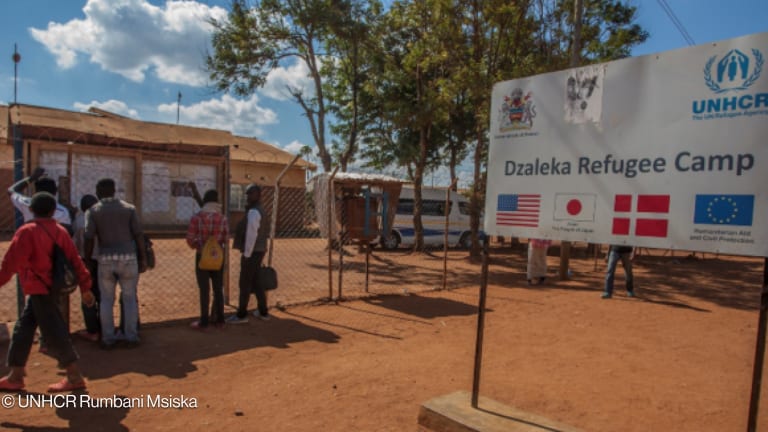
It’s been 17 years since I arrived at a Ugandan refugee camp with two children and a baby on my back. We had fled our home country, the Democratic Republic of Congo, after local militias stormed our community and killed several of my family members.
Life in the camp was a never-ending cycle of uncertainty: Will my family be safe here? Will we have enough food to eat? And then there were the invisible dangers: deadly diseases that were widespread throughout the camp. During our four-year stay in the camp, my children each came down with severe bouts of malaria and typhoid fever. By the grace of God, they survived. And to this day, I’m so grateful for the UN Refugee Agency and other agencies who helped us get through those dire situations. Unfortunately, many other children weren’t as fortunate.
Since moving to the United States in 2011, the realities that we left behind have gotten worse. In recent years, violent conflicts and climate shocks in the DRC and across East Africa have displaced millions. Uganda’s refugee population has increased tenfold — from 139,442 in 2011 to 1,463,523 in 2022. Over half of these refugees are children. This regional crisis reflects a troubling trend globally: the share of displaced people worldwide has nearly doubled over the past decade, reaching 120 million by May this year. Approximately 43 million of those are children.
This is more than just a humanitarian emergency. It’s a health emergency. Today, millions of children are living in overcrowded camps where deadly diseases such as malaria and diarrheal diseases are widespread. These children can easily die from these diseases because of their low immunity. And yet, far too often refugees are excluded from immunization drives, bed net distributions, and other public health programs. This is unacceptable. Countries and the global community must take a shared responsibility to ensure that children who have been displaced due to no fault of their own have consistent access to these life-saving services.
Take action to ensure a healthy start for refugee children
The good news is that progress is possible, and there are actions we can take to make a real difference in the lives of children and families. For the past seven years, I’ve been a dedicated champion for the United Nations Foundation’s United to Beat Malaria campaign. This month, Beat Malaria and its sister campaign, Shot@Life, launched a new initiative: Healthy Start for Refugee Children. Healthy Start aims to ensure that at least 1 million displaced children have access to essential health services, such as immunizations, malaria prevention, diagnosis, treatment, and nutritional support. The initiative will focus on children living in refugee camps and host communities in Uganda, South Sudan, and Ethiopia. We won’t be able to reach our goal without support from individuals and private sector partners. Visit Healthy Start to learn more, donate, and explore partnership.

Healthy Start will do more than provide health interventions. It will also make a long-term impact by supporting networks of local community health workers. These CHWs will educate camp residents about local disease threats and the importance of public health interventions such as vaccines and bed nets. This education element is so critical. I remember having such little health care knowledge when I was living in a refugee camp and didn’t fully understand the value of vaccines until I moved to the U.S.
New partner initiative launched to protect refugee children’s health
As global displacement rates reach historic levels, countries are struggling to meet the health needs of displaced populations. UN Foundation’s Margaret McDonnell explains how a new initiative will strengthen health care access for refugee children
Taking it a step further, Healthy Start will work with partners such as UNHCR to raise awareness and advocate for the inclusion of refugees and displaced persons in national health systems, as well as the prioritization of refugees in major health initiatives such as the Global Fund to Fight AIDS, Tuberculosis and Malaria and Gavi, the Vaccine Alliance — programs that I’ve actively advocated for on Capitol Hill.
Today, my life is full of blessings. My children continue to thrive in the U.S.; two are at top colleges, and one is close to following in their footsteps. I have been able to earn my master’s degree in public administration as well as graduate certificates in health administration and global health. I was also recently accepted into a doctorate program for public administration.
Now that I have all this knowledge and first-hand experience about the health challenges of refugees, I can’t seem to shake that horrible feeling: What if my children never made it out of that camp?
Visit the Healthy Start website to donate, use our social media toolkit to spread the word, and learn how you can partner and get involved.








